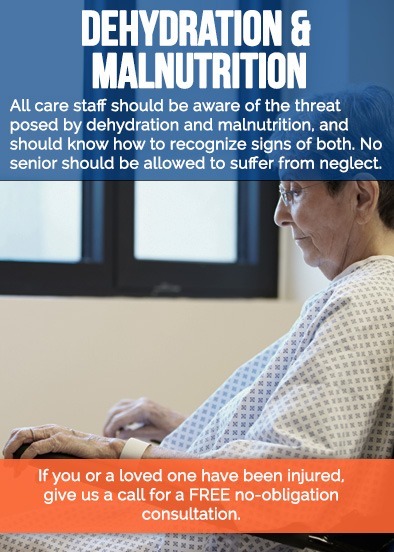 Good diet and hydration are among the most basic things a nursing home can provide for elderly residents. But malnutrition and dehydration are tragically common in elder care facilities.
Good diet and hydration are among the most basic things a nursing home can provide for elderly residents. But malnutrition and dehydration are tragically common in elder care facilities.
Sadly, these conditions can lead to a slow decline in overall health and make it impossible for a senior to recover from other conditions or surgery. In many cases, undernourishment or dehydration are factors in a senior’s death.
You or your loved one deserve only the best care at a Georgia nursing home. All care staff should be aware of the threat posed by dehydration and malnutrition and should know how to recognize signs of both.
Staff should be able to provide nourishing meals in many forms including liquids. No senior should be allowed to suffer from neglect.
If your loved one experienced malnutrition or dehydration in a care facility, you need to speak to a knowledgeable Atlanta nursing home abuse lawyer. John Foy & Associates are among the most experienced elder neglect attorneys in Georgia.
We offer a free consultation. Call us at 404-400-4000 and get your free consultation today.
What Counts as Malnutrition in Seniors?
To an untrained eye, a senior can look perfectly normal even as they suffer from a lack of nourishment. Malnutrition does not always mean that a person appears to be starving—indeed, the transformation can be gradual. But it can also be deadly, and it’s endemic in our nursing homes.
A 2013 study across six major nursing homes found that over 60% of seniors were either malnourished or at risk of malnutrition. That means that 3 out of 5 residents could face health risks related to diet.
Clinically, malnutrition is defined by weight loss. If an individual loses 4 to 5% of their body weight over a period of six to twelve months, it could be a sign of malnutrition. In practice, there are many causes of undernourishment:
- Decreased appetite. This can be a normal part of aging or it can be associated with other health conditions.
- Diet restrictions. A senior may be less interested in eating if they require a special diet such as low sodium, a diabetes diet, etc.
- Difficulty eating. Seniors may require help cutting their food or eating or may have difficulty chewing or swallowing as they age.
- Isolation. Even in a nursing home, seniors may not take pleasure in meals if they eat alone or have no close friends. The result can be a decrease in food intake.
- Medication. Many medications are associated with weight loss and reduced appetite, including Digoxin, thyroid hormones, a variety of Alzheimer’s medications, and others.
Get the strong arm
What Causes Dehydration in Seniors?
Dehydration means your body is losing more fluids than it brings in. For seniors, it’s common for many of the same reasons as malnutrition and because seniors’ bodies do not conserve water as well as they did when they were younger.
Similarly, seniors’ sense of thirst diminishes even though their need for water does not, and their bodies are less able to respond to changes in temperature. And since people tend to drink beverages with meals, dehydration, and malnutrition often go hand in hand.
As a senior becomes dehydrated, their body may have difficulties performing basic functions. Dehydration can happen quickly and have a very serious impact on health.
What Are the Health Effects of Dehydration or Malnutrition?
Both dehydration and malnutrition lead to substantial health risks. Malnutrition can weaken the immune system, leaving your loved one susceptible to other diseases and infections. It can also result in poor wound healing (especially after surgery) and muscle weakness/fatigue. This weakness can lead to dangerous falls.
Dehydration has numerous potentially deadly complications:
- Kidney failure when the kidneys no longer have the fluid to do their job.
- Hypovolemic shock, also known as ”low volume shock,” occurs when the body no longer has enough blood to circulate oxygen where it’s needed.
- Brain swelling when a dehydrated person suddenly gets fluids again.
- Heat injury potentially includes lethal heatstroke.
- Coma or even death.
Both malnutrition and dehydration can make other health conditions more serious, or harder to recover from. Seniors have a harder time recovering from malnutrition or dehydration in general. Our personal injury attorney in Atlanta can provide comprehensive legal assistance beyond nursing home abuse, including a variety of personal injury cases that affect our community.
How Can Nursing Homes Prevent Malnutrition and Dehydration?
Nursing homes have a duty to safeguard the health of their residents. Ensuring proper nutrition and water intake are among the most basic and essential steps they can take. However, many do not do their due diligence in preventing malnutrition or dehydration.
The most important way to prevent malnutrition is to track a senior’s weight. Any decline in weight should be treated as a potential sign of malnutrition and investigated. This metric can be combined with qualitative assessments by nurses or caregivers, who may notice a change in what the patient eats or how much they consume.
Care staff can often prevent malnutrition by simply being patient and attentive during meals. They can help the senior eat, and provide liquid meals such as shakes if the senior has difficulty chewing. This can stop many problems before they even begin.
Hydration is managed similarly. All care staff should be trained to monitor the water intake of residents. “Hydration stations” should be located throughout the facilities. Coffee and tea, which can contribute to dehydration, should be balanced out with pure drinking water or other healthy drinks.
There is no such thing as 100% effective prevention. However, care staff should routinely look for signs of dehydration and/or malnutrition. If they fail to do this it means they have failed in their most basic duty as elder care providers. This amounts to neglect and they are liable for the consequences.
What Can a Georgia Elder Neglect Lawyer Do to Help?
If your loved one experienced dehydration or malnutrition in a nursing home, they have been subject to elder abuse. Their undernourishment or dehydration may have been factors in other health developments. The nursing home knew how serious these conditions can be and should have taken action to prevent them.
If this has happened to your family, you may be entitled to a financial recovery. Your recovery can help pay for your loved one’s medical bills. It cannot restore the health that they lost due to neglect in a nursing home. But it can provide relief from medical bills for your family, and provide better care going forward.
The attorneys of John Foy & Associates are here to help. We are one of the largest, most experienced elder care law firms in Atlanta. We believe in standing up for seniors and their families, and we charge nothing unless we can win you a financial recovery.
Call 404-400-4000 and get your FREE consultation today.
(404) 400-4000 or complete a Free Case Evaluation form




